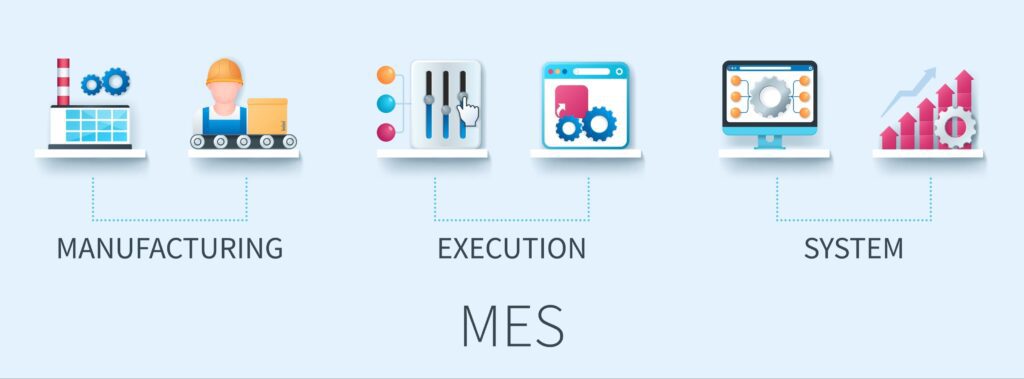In the rapidly evolving world of manufacturing, efficiency, precision, and quality are non-negotiable factors for success. Manufacturers constantly seek ways to enhance these areas to remain competitive and profitable. One of the most effective solutions for achieving these objectives is the implementation of a Manufacturing Execution System (MES). An MES plays a critical role in bridging the gap between the production floor and enterprise-level systems, helping companies streamline their processes, reduce errors, and increase overall productivity. But what exactly is an MES, and how does it function in manufacturing?
A Manufacturing Execution System (MES) is a software solution that monitors, controls, and optimizes production operations on the shop floor. MES integrates real-time data from machinery, workers, and systems to provide an accurate, comprehensive view of what is happening in a manufacturing plant at any given moment. It connects with other systems, such as Enterprise Resource Planning (ERP) and Supervisory Control and Data Acquisition (SCADA), to ensure a seamless flow of information throughout the entire production chain.
In today’s global market, manufacturers are under pressure to innovate faster and produce high-quality products at a lower cost. MES is designed to address these challenges by improving the efficiency, visibility, and control of manufacturing processes.
Related Topic: Transitioning to an MES-Driven Manufacturing Environment
Key Functions of MES in Manufacturing
The primary purpose of an MES is to ensure that manufacturing operations are executed efficiently by tracking and documenting the transformation of raw materials into finished products. To do this, MES provides a variety of key functions that improve the quality and productivity of manufacturing.
Real-Time Monitoring and Data Collection
An MES collects data in real-time from equipment, sensors, and personnel on the production floor. This continuous stream of information allows plant managers to monitor production performance, identify potential issues, and make data-driven decisions to optimize operations. Real-time data collection is essential for ensuring that production schedules are met, and for tracking key performance indicators (KPIs) such as machine uptime, cycle times, and output rates.
Work Order Management
One of the core functions of an MES is managing work orders and ensuring that production schedules are followed. By tracking the progress of each work order in real-time, an MES provides visibility into what is being produced, how long it will take, and where potential bottlenecks exist. Work order management also includes assigning resources, tracking materials, and ensuring that proper procedures are followed during production.
Quality Control
Maintaining consistent quality across products is one of the biggest challenges in manufacturing. An MES assists in quality control by collecting data on product specifications, tolerances, and defects in real-time. The system can automatically flag any deviations from set standards, allowing quality control personnel to intervene before defective products make it to the next stage of production. This proactive approach to quality management not only reduces waste but also ensures compliance with industry standards and customer requirements.
Production Scheduling and Planning
MES systems provide advanced tools for production planning and scheduling. By analyzing real-time data and historical performance, an MES can generate optimized production schedules that take into account machine availability, material constraints, and labor resources. This ensures that the plant runs smoothly and that production goals are met with minimal delays or interruptions.
Traceability and Compliance
In highly regulated industries such as pharmaceuticals, aerospace, and food manufacturing, traceability is critical. An MES enables full traceability by capturing detailed records of every step in the production process, including the materials used, machines operated, and personnel involved. This data is invaluable for meeting regulatory compliance, conducting audits, and responding to recalls or quality issues. MES ensures that manufacturers can quickly identify and isolate any defects or non-conformities, minimizing the impact on the business and its customers.
Related Topic: From Data to Success: Deciphering the Manufacturing Execution Systems (MES)
How MES Transforms Manufacturing Operations?
Manufacturers who implement MES experience a significant transformation in their operations. From improved efficiency to enhanced visibility, the benefits are wide-ranging.
Increased Efficiency and Productivity
One of the most immediate benefits of using an MES is the boost in overall efficiency. With real-time data at their fingertips, plant managers can make quick, informed decisions that prevent downtime, optimize resource allocation, and reduce waste. This, in turn, leads to higher productivity and lower operational costs.
Improved Visibility and Control
By providing a unified view of the entire production process, MES gives manufacturers greater control over their operations. It enables real-time tracking of production performance, allowing companies to quickly identify bottlenecks or issues and resolve them before they escalate. With better visibility, manufacturers can also ensure that resources are used effectively, reducing waste and improving overall performance.
Better Quality Assurance
Manufacturing defects can be costly and time-consuming to address. An MES enhances quality assurance by automating the tracking of product quality and flagging issues as they arise. This ensures that quality standards are maintained throughout the production process and reduces the likelihood of defective products reaching customers.
Enhanced Collaboration Between Departments
An MES facilitates better communication and collaboration between various departments, including production, quality control, maintenance, and logistics. By providing a centralized system for sharing information and data, MES ensures that everyone is working from the same playbook. This leads to smoother workflows, fewer misunderstandings, and a more cohesive production environment.
Reduction in Downtime
Unplanned machine downtime can significantly disrupt production schedules and lead to missed deadlines. MES helps manufacturers minimize downtime by providing predictive maintenance alerts and real-time monitoring of equipment performance. By addressing potential issues before they result in a breakdown, MES ensures that machines are kept in optimal condition, and production runs smoothly.
Related Topic: Implementing MES in Batch Production
MES in Manufacturing: A Game-Changer for Industry 4.0
Industry 4.0 represents the fourth industrial revolution, characterized by the integration of advanced technologies such as automation, the Internet of Things (IoT), and artificial intelligence into manufacturing. MES plays a pivotal role in this transformation by serving as the backbone for digital manufacturing. It enables companies to connect their machines, workers, and processes in a seamless, data-driven ecosystem that improves agility, efficiency, and innovation.
As manufacturers increasingly adopt smart factories and move towards fully automated production lines, the role of MES becomes even more critical. It acts as a hub for collecting and analyzing data from IoT devices, sensors, and robotics, facilitating the transition to a more connected, intelligent manufacturing environment.
Related Topic: The Benefits of MES
Challenges and Considerations When Implementing MES in Manufacturing
While MES offers numerous benefits, implementing such a system can be challenging, especially for companies new to digital transformation. Several factors must be considered to ensure a successful MES deployment.
System Integration
One of the biggest hurdles when implementing an MES is ensuring that it integrates smoothly with existing systems, such as ERP and SCADA. Manufacturers must carefully assess their current infrastructure and choose an MES that is compatible with their other software solutions. Seamless integration is essential for ensuring that data flows smoothly between systems and that there is no duplication of efforts.
Cost and ROI
Implementing an MES can be a significant investment, particularly for small and medium-sized manufacturers. It’s important to weigh the initial costs against the potential return on investment (ROI). Many manufacturers find that the long-term benefits, such as increased efficiency, reduced downtime, and improved quality, far outweigh the initial costs.
Training and Change Management
Introducing a new system like MES requires training staff and managing organizational change. Resistance to change is common, particularly among employees who are used to traditional ways of working. To ensure a smooth transition, companies should invest in comprehensive training programs and clearly communicate the benefits of MES to all stakeholders.
Related Topic: MES Integration Challenges and Solutions
Final Thoughts: MES in Manufacturing – The Future of Smart Manufacturing
As manufacturing embraces digital transformation, Manufacturing Execution Systems (MES) have become crucial for remaining competitive in Industry 4.0. Companies using MES can streamline operations, enhance quality control, and boost efficiency.
By providing real-time insights and operational flexibility, MES helps manufacturers meet global market demands.
Moving forward, MES will integrate with AI and advanced analytics, driving innovation, cutting costs, and accelerating production. For expert MES solutions, EZSoft offers top-tier services. Learn more at ezsoft-inc.com.
FAQ’s
What is the role of MES in manufacturing?
MES (Manufacturing Execution System) monitors and controls production processes, optimizing efficiency, resource use, and quality.
How does MES improve quality control in manufacturing?
MES automates quality checks, tracks real-time production data, and detects deviations early, ensuring consistent product quality.
Can MES help reduce downtime?
Yes, MES reduces downtime through real-time monitoring and predictive maintenance alerts, preventing machine breakdowns.
Is MES suitable for small and medium-sized manufacturers?
MES is scalable, making it suitable for small and medium manufacturers seeking efficiency and quality improvements.
What are the main challenges of implementing MES?
Challenges include system integration, high initial costs, and employee training for successful adoption.
How does MES integrate with ERP systems?
MES and ERP systems share data between production and business operations, improving coordination and decision-making.









